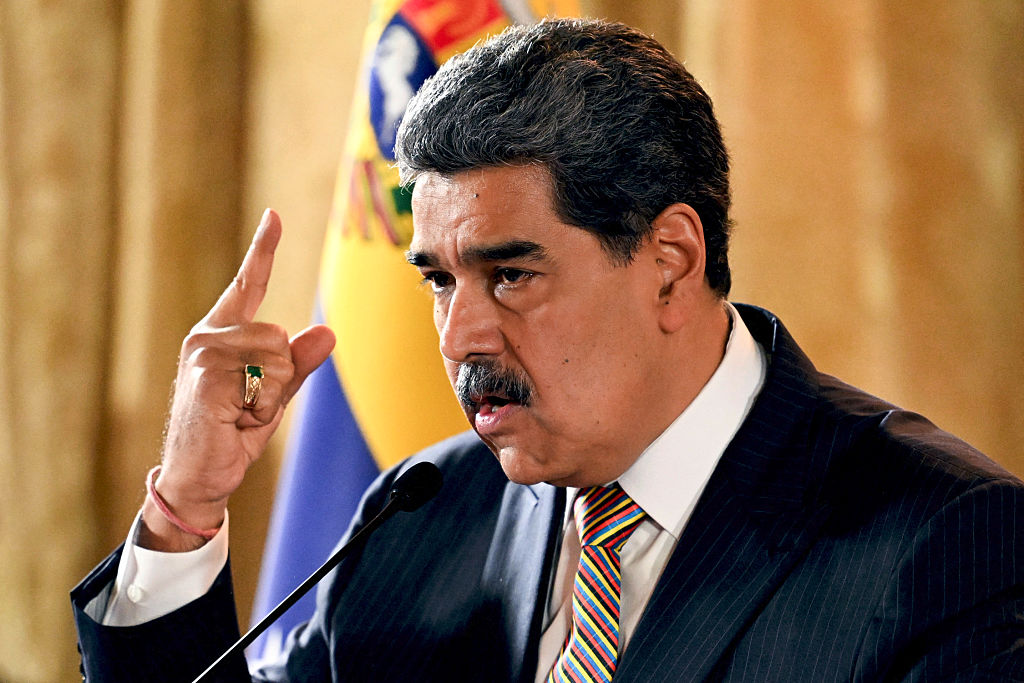Signals are growing louder that U.S. President Donald Trump wants Venezuelan President Nicolás Maduro out of office. He’d like to accomplish this without starting a war that might not go to plan.
So far, U.S. military action against Venezuela has been limited to strikes against more than a dozen boats the White House insists are carrying narcotics toward the U.S.—drugs that Trump said in a Nov. 2 interview on 60 Minutes are “destroying families all over our country.” Asked if that meant war, Trump said, “I don’t think so. But they’ve been treating us very badly.” Some 69 people have been killed by U.S. strikes on boats in the Caribbean and eastern Pacific in recent weeks.
[time-brightcove not-tgx=”true”]
The U.S. has now moved significant military hardware into position in the Caribbean, deploying an aircraft-carrier group and placing significant naval strike capability and U.S. troops just off Venezuela’s coast. The next U.S. step could be to hit targets inside Venezuela that the Trump Administration insists fuel the drug trade. “I’m not gonna tell you what I’m gonna do with Venezuela, if I was gonna do it or if I wasn’t going to do it,” Trump said in the same 60 Minutes interview. In addition, U.S. officials reportedly told the New York Times last month that “the Trump Administration [had] secretly authorized the CIA to conduct covert action in Venezuela.”
Although Venezuela plays a minor role in the trafficking of drugs that reach the U.S., a hard line against Caracas appeals to Trump’s MAGA base and Latino backers who think the U.S. is too soft on Latin American leftists like Maduro, who has been in power since the death of Hugo Chávez in 2013 and is accused of stealing the 2024 election.
Read More: Trump’s War on ‘Narcoterrorists’ Is Doomed to Fail
Enter the growing U.S. pressure, which appears aimed at persuading Maduro’s inner circle that the cost of continued loyalty to Venezuela’s strongman has become too high, and that he should be removed from within to avoid military escalation. If these tactics fail, the Trump Administration might target Maduro directly.
A move against Maduro from within Venezuela’s security services would probably lead to U.S.-Venezuelan negotiations that allow a member of Maduro’s team to replace him. A new President from within the armed forces might mend fences with Washington. In a less likely scenario, given deep military mistrust of the opposition, some segments of the military could side with opposition leaders María Corina Machado and Edmundo González or push for fresh elections.
Read More: Venezuela’s Opposition Is Using Misinformation
But dealing with Maduro’s men remains the only way to avoid war. The ruling United Socialist Party of Venezuela controls all of the country’s powerful institutions, including state-run oil company Petróleos de Venezuela S.A., the regime’s cash cow. To cut Maduro loose, the security services would demand guarantees that their safety, and control of the country’s power and access to wealth, would be protected, likely with international mediation that makes Trump Administration commitments more credible.
Yet senior Venezuelan military leaders know that Maduro uses Cuban intelligence to spy on his own generals, and that any move against their President risks execution. To persuade them to move, the U.S. could directly target senior members of the regime, like Interior Minister Diosdado Cabello—for whom there is an outstanding $25 million U.S. reward—to press others to act.
Trump knows that failure to remove Maduro could prove humiliating. And if Maduro is removed by direct U.S. military action, the situation inside Venezuela could quickly spiral out of control, forcing the U.S. President into decisions he’d rather avoid. Widespread social unrest could cost Trump the ability to influence who’s in charge in Caracas and, assuming a deep reluctance in the White House to put American troops in harm’s way to keep order, could leave Trump responsible for an ensuing bloodbath as Venezuela’s army and security services fight to contain the risk of civil war.
The U.S. President will make the final call, now that a bid to check his war powers have failed in the Senate. And while he appears supportive of an escalating pressure campaign, there’s no indication yet that he has settled on a single strategy to get what he wants.

